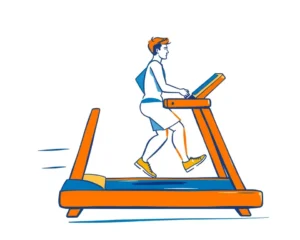In today’s fast-paced world, mental health is just as important as physical health. While many factors contribute to our emotional and psychological state, exercise stands out as a powerful and accessible tool for boosting mental wellbeing. Studies have shown that regular physical activity can significantly reduce symptoms of anxiety, depression, and stress, while improving mood, cognitive function, and self-esteem. But with so many options available, which types of exercise are most effective for enhancing mental health?
The Science Behind Exercise and Mental Health
The link between exercise and mental health is multifaceted. When you engage in physical activity, your brain releases endorphins, which are natural chemicals that act as painkillers and mood elevators. Exercise also influences other brain chemicals like serotonin and stress hormones, helping to regulate mood and reduce feelings of anxiety.
Beyond neurochemical changes, exercise offers several other mental health benefits:
- Reduced Stress: Exercise helps to alleviate the physical symptoms of stress, such as muscle tension, and promotes relaxation.
- Improved Sleep: Regular physical activity can improve sleep quality, which is crucial for mood regulation and overall mental wellbeing.
- Increased Self-Esteem: Achieving fitness goals, no matter how small, can boost your confidence and sense of self-worth.
- Sharper Memory and Thinking: Exercise stimulates the growth of new brain cells and improves cognitive function, including memory and concentration.
- Distraction from Worries: Engaging in physical activity can provide a welcome distraction from negative thoughts and rumination.
- Social Connection: Exercising with others can provide opportunities for social interaction and support, combating loneliness and isolation.
Top Exercises for Boosting Mental Health
While any form of physical activity can be beneficial, certain types of exercise have been shown to be particularly effective for improving mental health:
Aerobic Exercise: Elevating Mood and Reducing Anxiety
Aerobic exercises, such as running, swimming, cycling, and dancing, are excellent for reducing anxiety and depression. These activities increase blood circulation to the brain and influence the hypothalamic-pituitary-adrenal (HPA) axis, which controls our physiological response to stress.
- Running: Running is a well-documented anxiety reducer. It releases endorphins that lift your mood and lower stress levels. Even a 20- to 30-minute run a few times a week can make a difference.
- Swimming: Swimming provides a refreshing and therapeutic exercise that can ease anxiety and lift symptoms of depression. The water’s buoyancy can be incredibly relaxing, while the rhythmic movements promote a sense of calm.
- Cycling: Whether you’re on a stationary bike or out on a trail, cycling can help boost your mood and lower stress levels. It is a great way to enjoy the outdoors while getting a good workout.
- Dancing: Moving to the beat is a fantastic way to boost your mood. Dancing combines physical activity with self-expression, which can be incredibly liberating and enjoyable.
Mind-Body Exercises: Finding Balance and Calm
Mind-body exercises, such as yoga, Tai Chi, and Pilates, integrate physical movements with mindfulness, breathing techniques, and meditation. These practices promote relaxation, reduce stress, and improve overall mental wellbeing.
- Yoga: Yoga combines mindful movement, stretching, and controlled breathing, creating a natural remedy for anxiety and depression. Practicing yoga can help ease tension, reduce stress, and promote mindfulness.
- Tai Chi: This ancient Chinese martial art involves slow, graceful movements and deep breathing techniques. Tai Chi has been shown to reduce stress, anxiety, and depression, improve mood, and increase energy levels.
- Pilates: Pilates focuses on core strength, flexibility, and body awareness. It can help reduce stress and improve mood.
Strength Training: Building Strength and Confidence
Strength training, or weightlifting, is not just for building muscle. It can also significantly improve mental health by boosting self-confidence, reducing anxiety, and improving cognitive function.
- Weightlifting: Lifting weights can provide a sense of accomplishment and empowerment, boosting self-esteem and reducing symptoms of depression.
- Bodyweight Exercises: Simple exercises like squats, push-ups, and lunges can be done anywhere and provide similar benefits to weightlifting.
Outdoor Activities: Harnessing the Power of Nature
Exercising in nature, also known as “green exercise,” has been shown to have greater positive effects on mental wellbeing than exercising indoors. Exposure to natural environments can decrease stress, improve cognitive function, and enhance mood.
- Hiking: Hiking is a natural remedy for anxiety and depression. Being surrounded by nature can be incredibly calming and restorative.
- Walking: Walking may seem simple, but it’s one of the most accessible and effective exercises for managing anxiety and depression. Walking outdoors offers an extra boost, with natural light and fresh air helping to ease symptoms.
- Gardening: Gardening combines physical activity with the therapeutic benefits of nature. It can reduce stress, improve mood, and provide a sense of accomplishment.
Team Sports: Fostering Social Connection and Reducing Stress
Team sports provide not only physical exercise but also opportunities for social interaction, teamwork, and a sense of belonging. These factors can significantly contribute to improved mental health.
- Basketball, Soccer, Volleyball: Participating in team sports can reduce symptoms of common mental disorders, lower mental health problems, and decrease symptoms of anxiety.
- Group Fitness Classes: Joining a group fitness class can provide a similar sense of community and support.
How Much Exercise is Enough?
The U.S. Department of Health and Human Services recommends at least 150 minutes of moderate aerobic activity or 75 minutes of vigorous aerobic activity per week for most healthy adults. However, even small amounts of physical activity can be helpful. Being active for short periods of time, such as 10 to 15 minutes at a time, throughout the day can add up and have health benefits.
Getting Started and Staying Motivated
Starting an exercise routine can be challenging, especially when you’re struggling with mental health issues. Here are some tips to help you get started and stay motivated:
- Start Small: Begin with just a few minutes of exercise per day and gradually increase the duration and intensity as you feel more energized.
- Find Activities You Enjoy: Choose activities that you find fun and engaging, as you’re more likely to stick with them.
- Set Realistic Goals: Set achievable goals to avoid feeling overwhelmed or discouraged.
- Make it a Routine: Schedule exercise into your day like any other important appointment.
- Find a Workout Buddy: Exercising with a friend can provide motivation and support.
- Reward Yourself: Celebrate your accomplishments, no matter how small.
- Be Patient: It takes time to see results, so don’t get discouraged if you don’t feel better immediately.
- Listen to Your Body: Rest when you need to and don’t push yourself too hard, especially when you’re first starting out.
The Bottom Line
Exercise is a powerful tool for improving mental health and overall wellbeing. By incorporating regular physical activity into your routine, you can reduce symptoms of anxiety, depression, and stress, while boosting your mood, cognitive function, and self-esteem. Whether you prefer running, yoga, hiking, or team sports, find activities that you enjoy and can consistently do. Remember, even a small amount of exercise can make a big difference.







